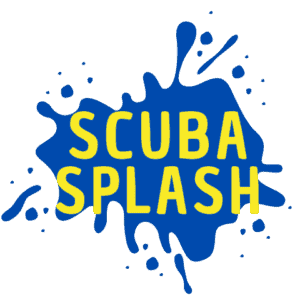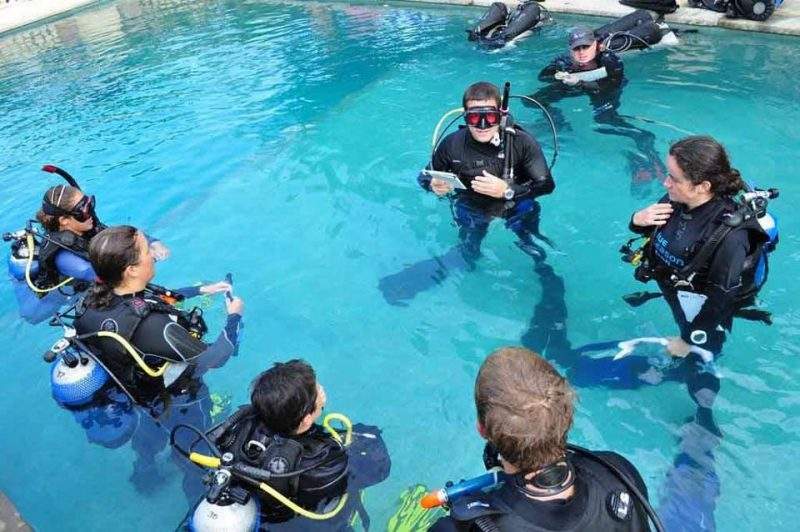As a new diver you may come across the terms open water and advanced open water certified. Exactly how different are these levels and should you consider becoming advanced? Let’s take a closer look to determine what the difference is and how to choose the best one.
The biggest difference between open water certified and advanced open water certified divers is experience and maximum depth. Open water divers can go as deep as 60 feet (18 m) while advanced open water divers can go down to 100 feet (30 m). Advanced divers have more experience with a wider variety of dives and have sharper technical skills.
| Open Water | Advanced Open Water |
|---|---|
| 60 ft (18 m) Depth Max | 100 ft (30 m) Depth Max |
| 3-5 Days Training | 2-3 Days Training |
| $300-$500 | $190-$300 |
| 5 Dives | 5 Dives |
| Basic Knowledge | More Training |
| Basic Training | Enhanced Navigation |
| Better Buoyancy | |
| Adventure Dives |
Depth
The biggest difference is the maximum depth divers are allowed to go. Open water certifications are allowed to reach a depth of 60 feet (18 m) while advanced divers can go 100 feet (30 m) deep.
It may not seem like that much of a difference but most shipwrecks are in deep waters along with a larger variety of marine life. As an advanced diver, you will have more freedom to go on dives with a wider depth range and explore a varying amount of underwater territory.
It’s not advised for open water divers to exceed the maximum depth of 60 feet (18 m). Diving in deep waters slows down cognitive function, impairs judgment, and can cause panic or disorientation. If you want to dive deeper than 60 feet (18 m) then you’ll need to get certified first.
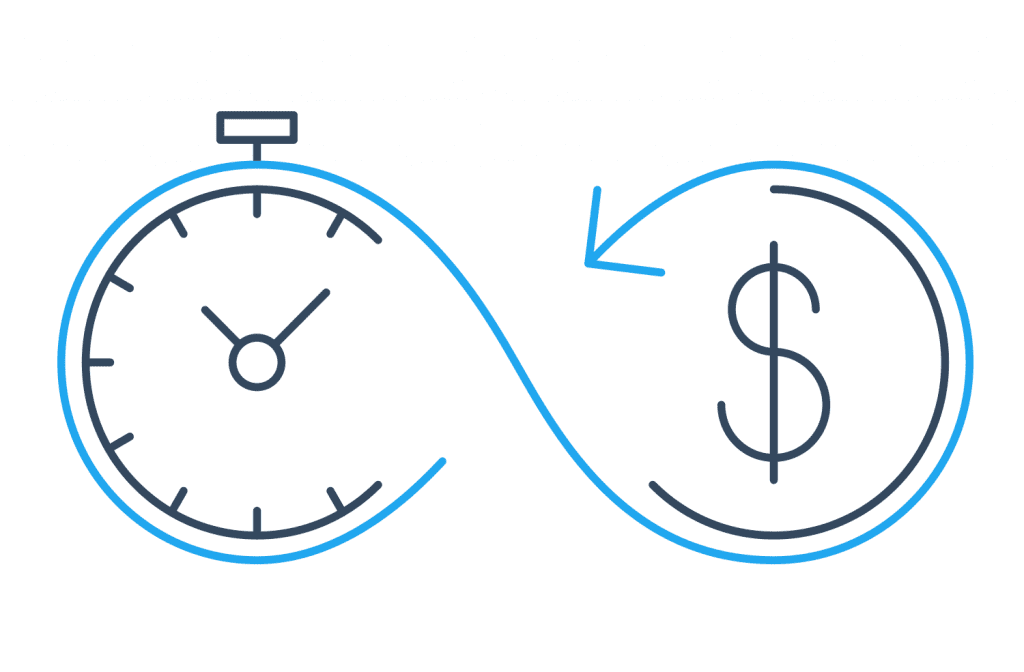
Time and Money
The open water course is more expensive but every diver has to start at this first level. You can’t skip to advanced because everyone needs to learn the basics first. Expect to pay anywhere from $300-$500 depending on where you learn. Portions of the course are available online which can help reduce the overall cost.
This might seem like a lot but scuba certifications are for life. You only need to take the course once since it never expires and you never need to get it renewed. Plus, there is a lot of learning and education that goes on prior to ever stepping foot into the water. You’ll spend at least 2-3 days learning information and taking quizzes before anything else.
From here, you move on to the confined water portion where you go into a pool and experience scuba for the first time. Expect to spend at least 1 full day at the pool breathing underwater, swimming, and getting introduced to your equipment.
Lastly, it’s time for the open water where you will perform at least 2 different types of water entries and learn how to maneuver in the water. This portion usually takes 1-2 days depending on the dives and how early you start.
Advanced courses are less expensive because they take less time and are mainly composed of various types of adventure dives. Learn more about adventure dives HERE. There is some information and bookwork but it’s nothing like the open water level.
Expect to pay anywhere from $190-$300 depending on the location of the course. The educational aspects of the course are available online which can be a less expensive option. However, the 5 required adventure dives need to be conducted with a certified instructor.
Expect an advanced certification to take 2-3 days depending on the pace of the instructor and how many dives are done each day.
Knowledge
Open water divers are given a basic level of knowledge. It’s just enough to get you comfortable and in the water safely. You will learn about how diving works, how to use your equipment, and how to enter the water.
There is quite a lot of bookwork and classroom time for the open water level and this includes quizzes and exams. The workbook is separated into 5 different sections covering equipment, skills, problem management, dive computers, and respectful practices.
The bookwork and lessons are what takes the most amount of time. You will also need to spend time in a pool to experience breathing underwater for the first time and face any fears that may surround that.
Advanced divers have a shorter class then open water but it is very informative. You can expect it to take just 2-3 days to complete the course which is about half the time as an open water certification. Most instructors cover bookwork between dives to reduce the amount of time it takes to complete the course. As with all levels of scuba certification, the next level up is an extension of the previous level.
Advanced students will learn more about navigation and have the opportunity to focus on dives that are personally interesting. If you have always wanted to learn about fish identification or dry suits or caves then this is your moment to explore through adventure dives.
Since there are no tests in the advanced course, divers have more time to explore special interests and perfect underwater skills with an advanced level of instructor guidance.
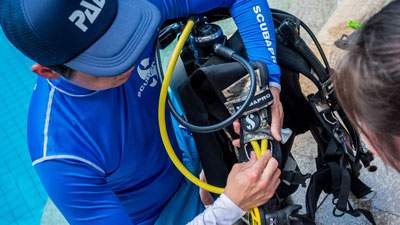
Training
Open water divers are trained on the basics of equipment use, underwater skills, and environmental awareness. You will learn how to attach and detach the air tank, how to properly weight yourself for dives, perform buddy checks, and learn how to correctly enter the water.
From here open water divers will learn how to use their BCD for buoyancy while diving, how to breathe mindfully, check gauges, follow underwater instructions, and learn respectful dive practices. Think of open water certifications as entry-level courses that offer a brief overview of diving.
After learning all the information and being introduced to diving, beginners will experience a learning curve. Elements such as water entry, buoyancy, navigation, gauge awareness, breath control, swimming, and underwater etiquette need to be perfected and the only way to do this is through practice. Luckily, it usually happens rather quickly with regular diving.
The advanced level focuses more on navigation, deep dive cognitive skills, specialty courses, and buoyancy. Divers will spend time performing tasks that pertain to navigating and counting kick-cycles. You will also experience your first deep dive of 100 feet (30 m) and test your cognitive skills at deeper depths. There is a lot more time to practice and master the art of buoyancy and learn how breathing is directly related to it.
Advanced open water offers divers more time to craft their skills and explore more diving possibilities. You might even find that the class size is smaller so you’ll have the opportunity for more personalized attention.
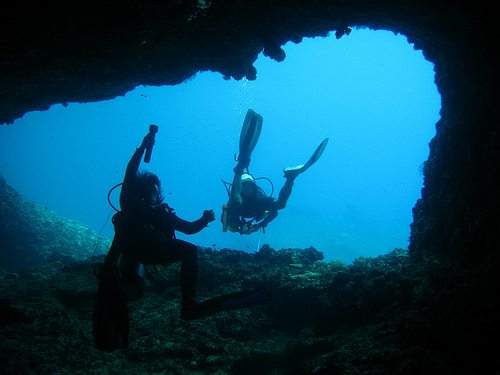
Adventure Dives
The best part of becoming an advanced diver is the specialty courses and adventure dives. These divers are only offered to advanced level divers. Part of getting certified requires that you successfully complete 5 adventure dives. Of the five adventure dives, underwater navigation and a deep water dive are mandatory.
This leaves you with 3 electives and lots to choose from. Some examples of options include night dive, wreck diving, drysuit, photography, fish identification, drift diving, altitude diving, cave diving, videography, and ice diving to name a few.
The location of your training will limit your options because someone taking an advanced course in Florida can’t really perform an ice water dive. So take that into consideration when choosing where you are getting certified and what types of dives interest you.
Which level is for you?
Honestly, most people find that an open water certification is perfectly fine. They are comfortable will more shallow dives and just enjoy the experience of diving as a light hobby. If that’s you then there is no need to question yourself.
If you are open water certified and have more desire for expanding skills and challenging yourself then definitely signup for an advanced course. It is a wonderful way to gain more knowledge and explore more personal aspects of diving such as photography, ship wrecks or even ice diving.
Diving in itself is such a magical experience and all levels are equally amazing.
